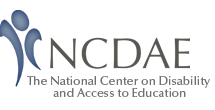NCDAE Accessibility Newsletter - October 2006
In this Edition:
- Feature Article: Web Captioning in Education
- Tips and Tool: OpenOffice.org Impress
- Webcast: Web Captioning in Education
- Factoid
- NCDAE Announces - TEITAC Subcommittees
- Affiliate Highlight: CAST
- In the News: Targeting Target
Feature Article: Web Captioning in Education
By: Jared Smith - NCDAE
Captioning web multimedia is one of the biggest accessibility issues facing education. Current technology and cost limitations make captioning, especially of live events, prohibitive for many. This article provides an overview of existing web captioning technologies, techniques, and standards and will overview the future of web captioning. The issues in this article will be highlighted in the October 25th NCDAE webcast.
http://ncdae.org/tools/captioning/
Tips and Tools: OpenOffice.org Impress
OpenOffice.org (often abbreviated OOo) is a free, open source office suite similar in many ways to Microsoft Office.
NCDAE has created a fact sheet outlining the accessibility features of OOo Impress (similar to PowerPoint). The resource also addresses accessibility considerations with documents exported to other formats, including PDF and HTML.
To read this fact sheet visit http://ncdae.org/tools/factsheets/impress.php
Webcast: Web Captioning in Education
Upcoming Webcast - Wednesday, Oct. 25, 2006
Join moderator Jared Smith on Wednesday, October 25, 2006 at 1PM MST (12:00PM Pacific; 2:00PM Central; 3:00PM Eastern) for the live audio broadcast. The broadcast is free of charge and will last approximately one hour. You will be able to tune in using your computer using either Windows Media Player or Quicktime. Archives (transcript and audio) will be available shortly after the conclusion of the broadcast. The broadcast will be captioned for the deaf and hard of hearing and archives will be available a few days after the conclusion of the broadcast.
To participate in the webcast, visit http://ncdae.org/webcasts/webcaptioning.php
Factoid
A 2005 Disability Status Report developed by Cornell University addresses the education distribution among working-age people (ages 21-64) with disabilities in the United States, using data from the 2005 American Community Survey (ACS). According to the report:
In 2005, among working-age people with disabilities in the US:
- 24.8 percent had less than a high school degree
- 34.5 percent had a high school diploma/equivalent
- 28.0 percent had some college
- 12.8 percent had a Bachelor's degree or more
In comparison, in 2005, among working-age people without disabilities in the US:
- 11.5 percent had less than a high school degree
- 27.9 percent had a high school diploma/equivalent
- 30.5 percent had some college
- 30.1 percent had a Bachelor's degree or more
This 2005 Disability Status Report can be found at http://www.ilr.cornell.edu/ped/disabilitystatistics/StatusReports/2005-html/2005-StatusReports_US.html
More needs to be done to address this disparity in education. One critical step is to ensure that educational materials are accessible to students with disabilities. What else can be done to ensure that people with disabilities are able to attain their educational goals? NCDAE welcomes your comments.
NCDAE Announces
Telecommunications and Electronic and Information Technology Advisory Committee (TEITAC) Subcommittees
TEITAC is a federal advisory committee formed to recommend updates of accessibility guidelines issued under section 508 of the Rehabilitation Act in 2000 and section 255 of the Telecommunications Act. TEITAC members represent over forty industry, disability advocacy, standard-setting bodies in the U.S. and abroad, and government agencies, among others. NCDAE is proud to represent the education sector on this prestigious committee.
TEITAC is currently comprised of eight sub-committees and task forces. Each subcommittee has a wiki page devoted to it. The wiki provides details about committee co-chairs, mailing lists, meeting times, resources, etc.
NCDAE has developed the format for the website and wiki and will provide web hosting and technical assistance for the project.
All TEITAC activities are open to the public. We invite you become involved and contribute to sub-committee and task force activities. For more information or to contribute, please visit the TEITAC website at http://teitac.org/
Affiliate Highlight: CAST
Center for Applied Special Technology
CAST is a nonprofit organization that works to expand learning opportunities for all individuals - especially those with disabilities - through the research and development of innovative, technology-based educational resources and strategies.
Since 1984, CAST has explored ways to use computer technologies to improve education for all children.In the early years, CAST approached the problem of expanded learning opportunities for people with disabilities by providing or developing assistive technology for individuals.However, as CAST researchers continued to test and refine their vision and principles, they came to a new understanding of how to individualize education using flexible methods and materials.
CAST calls this approach Universal Design for Learning (UDL). UDL offers a blueprint for creating flexible curriculum—i.e, instructional goals, methods, materials, and assessments—that accommodate a wide range of learner differences. Universally designed learning environments make education more inclusive and effective for all.
In two decades of research and development, CAST has earned international recognition for its development of innovative, technology-based educational resources and strategies based on UDL principles. CAST is known as the:
- Inventor of Bobby, a software tool that measures website accessibility and guides Web designers to make improvements. Bobby has earned CAST numerous accolades, including the Excellence in Access Award from the Association of Access Engineering Specialists (AAES) and honors.
- Originator of the Codie Award winning Thinking Reader®, a unique computer-based literacy program to provide struggling readers, with and without disabilities, in building reading comprehension skills while accessing full-text, high-quality literature.
- Developer (with Scholastic) of the Codie-Award winning WiggleWorks®, the first universally designed literacy program for beginning readers, which garnered CAST the 1993 Computerworld Smithsonian Award.
- Creator of CAST eReaderTM, a versatile, advanced literacy program that helps learners of various abilities gain access to electronic text, while supporting and enhancing their literacy development.
- Leader in developing the first National Instructional Materials Accessibility Standard (NIMAS) to guide the production and electronic distribution of digital versions of textbooks and other instructional materials so they can be more easily converted to a variety of accessible formats, including Braille and text-to-speech. As of August 2006, NIMAS is part of the federal IDEA regulations.
Through strategic collaborations, CAST continues to work on behalf of all learners, especially those with disabilities, by seeding the fields of education research, policy, professional development, and product development with UDL-based solutions.
In the News: Targeting Target
In a precedent setting decision, a judge ruled that a lawsuit brought by the National Federation for the Blind against retail giant Target could proceed.The lawsuit claims that Target's website is not accessible to users who are blind and is therefore in breach of the Americans with Disabilities Act, the California Unruh Civil Rights Act, and the California Disabled Persons Act. Target Inc. countered with a motion for dismissal claiming that these rules applied only to brick and mortar stores, not their online presence.
Federal District Court Judge Marilyn Hall Patel rejected Target's motion and ruled that the case did have enough merit to proceed to trial. While this is only the first step and not a final ruling on the suit itself, it does advance the case for accessibility and serves as a wake-up call to many retailers and web designers.The outcome of this case has the potential to set the criterion for web accessibility for many years to come.
The following are some of the articles regarding the Target lawsuit featured on the NCDAE RSS/News feed:
Target.com is off-target in usability lawsuit
http://www.expertclick.com/NewsReleaseWire/default.php?Action=ReleaseDetail&ID=14029
Target Case Ruling Victory for Accessibility
http://www.shayna.com/index.php?fuseaction=blog.display_entry&id=151
Ruling has web designers shifting gears
http://msnbc.msn.com/id/14995762/
Target v NFB Round-up
http://www.accessibilityblog.com/2006/09/19/target-v-nfb-round-up/
Blind group seeks change at Target.com
http://www.startribune.com/789/story/683476.html
Court Denies Target.com Plea for Dismissal
http://www.accessibilityblog.com/2006/09/07/court-denies-targetcom-plea-for-dismissal/
The Importance of Accessibility -Target, the ADA, and how it will affect us all
http://www.webproworld.com/viewtopic.php?t=67257
Target Hit - But is it a Bullseye?
http://accessify.com/news/2006/09/target-case-outcome/
Websites For The Blind: Is This The Next 'Year 2000 Compliant' Requirement?
http://www.localtechwire.com/article.php?u=14999
Target lawsuit tests limits of US web accessibility law
http://www.out-law.com/page-7285
Legal Precedent Set for Web Accessibility
http://biz.yahoo.com/prnews/060907/cgth051.html?
Accessibility Issue Comes to a Head: Target lawsuit could be a test case; new wave of apps concerns blind users
http://www.computerworld.com/action/article.do?command=viewArticleBasic&articleId=111219&
A Timely Reminder
http://accessify.com/2006/02/timely-reminder.php
NFB vs. Target in perspective
http://www.webstandards.org/2006/02/14/nfb-vs-target-in-perspective/
Taking Aim at Target(.com)
http://www.webstandards.org/2006/02/09/taking-aim-at-targetcom/
Target.com lawsuit moves forward
http://webaim.org/blog/2006/09/08/target_lawsuit/
Blind Patrons Sue Target For Site Inaccessibility
http://news.com.com/Blind+patrons+sue+Target+for+site+inaccessibility/2100-1030_3-6038123.html

